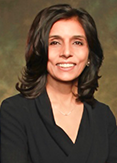Dr. Monica Bharel is a senior public health advisor helping technology companies to solve public health challenges, using the power of data and analytics to drive innovations and advance health opportunity for all. She is currently working at Google Health, as part of the Population and Environmental Health team, the Mental Health Center for Excellence team, and the Cloud Public Sector team.
Dr. Monica Bharel previously served as a Senior Advisor to the Mayor of Boston. She was appointed by Mayor Wu to lead the city’s response to the humanitarian crisis in the area known as Mass and Cass. She oversaw a public health, equity-led approach focused on individual medical and treatment needs. This transformative process has included offering low threshold housing and shelter options to unsheltered individuals with a focus on building an intermediate and long term plan to address the intersecting issues of homelessness, substance use disorder and mental health.
She previously served as Commissioner of the Massachusetts Department of Public Health. Dr. Bharel served as the Commonwealth’s chief physician from 2015-2021. She helped lead the state’s aggressive response to the opioid crisis and was dedicated to reducing health disparities and developing data-driven, evidence-based solutions for keeping people healthy. Dr. Bharel led the Massachusetts public health response to the COVID-19 pandemic.
As Commissioner, Dr. Bharel oversaw a public health workforce of nearly 3000 and an expansive department addressing issues, from environmental health to injury prevention to infectious diseases. Under her leadership, Massachusetts ranked nationally as among the healthiest states in the nation.
Dr. Bharel is a board-certified internist who has practiced general internal medicine for more than 20 years, including at Massachusetts General Hospital, Boston Medical Center, neighborhood health centers, the Veterans Administration and nonprofit organizations. She has served on the faculty of Harvard Medical School, Boston University Medical School, and Harvard School of Public Health, and has been recognized for her dedication to underserved and vulnerable populations. Prior to becoming Commissioner, she was Chief Medical Officer of Boston Health Care for the Homeless.
She holds a Master of Public Health degree through the Commonwealth Fund/Harvard University Fellowship in Minority Health Policy. She holds a medical degree from Boston University School of Medicine and completed a residency and chief residency in internal medicine at Boston City Hospital/Boston Medical Center.


